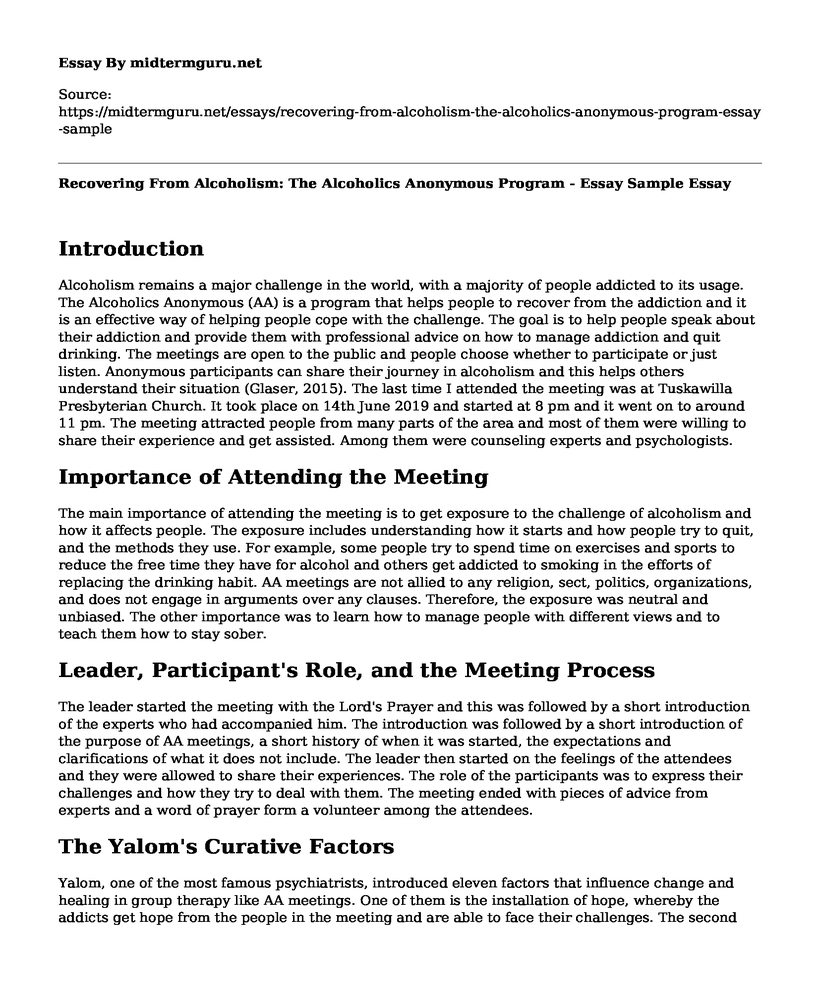Introduction
Alcoholism remains a major challenge in the world, with a majority of people addicted to its usage. The Alcoholics Anonymous (AA) is a program that helps people to recover from the addiction and it is an effective way of helping people cope with the challenge. The goal is to help people speak about their addiction and provide them with professional advice on how to manage addiction and quit drinking. The meetings are open to the public and people choose whether to participate or just listen. Anonymous participants can share their journey in alcoholism and this helps others understand their situation (Glaser, 2015). The last time I attended the meeting was at Tuskawilla Presbyterian Church. It took place on 14th June 2019 and started at 8 pm and it went on to around 11 pm. The meeting attracted people from many parts of the area and most of them were willing to share their experience and get assisted. Among them were counseling experts and psychologists.
Importance of Attending the Meeting
The main importance of attending the meeting is to get exposure to the challenge of alcoholism and how it affects people. The exposure includes understanding how it starts and how people try to quit, and the methods they use. For example, some people try to spend time on exercises and sports to reduce the free time they have for alcohol and others get addicted to smoking in the efforts of replacing the drinking habit. AA meetings are not allied to any religion, sect, politics, organizations, and does not engage in arguments over any clauses. Therefore, the exposure was neutral and unbiased. The other importance was to learn how to manage people with different views and to teach them how to stay sober.
Leader, Participant's Role, and the Meeting Process
The leader started the meeting with the Lord's Prayer and this was followed by a short introduction of the experts who had accompanied him. The introduction was followed by a short introduction of the purpose of AA meetings, a short history of when it was started, the expectations and clarifications of what it does not include. The leader then started on the feelings of the attendees and they were allowed to share their experiences. The role of the participants was to express their challenges and how they try to deal with them. The meeting ended with pieces of advice from experts and a word of prayer form a volunteer among the attendees.
The Yalom's Curative Factors
Yalom, one of the most famous psychiatrists, introduced eleven factors that influence change and healing in group therapy like AA meetings. One of them is the installation of hope, whereby the addicts get hope from the people in the meeting and are able to face their challenges. The second one is universality, whereby the addicts end their isolation and know they are not alone in the struggle against alcoholism. The third one is imparting information, whereby addicts are educated on how to deal with alcoholism. The fourth one is altruism and this involves making addicts feel relevant by helping other people in the group. The fifth one is corrective recapitulation which involves members of the group interacting as if they are one family (Blackmon, Cassell, McElderry, & Obisesan, 2016). The above factors are applied in the AA meetings and this makes it easy to communicate the intended messages to the target group.
References
Blackmon, V., Cassell, C., McElderry, C. G., & Obisesan, O. (2016). A qualitative impact evaluation of the First Love Yourself (FLY) women's support group. International Journal of Public Health, 5(2), 123-128.
Glaser, G. (2015). The irrationality of alcoholics anonymous. The Atlantic.
Cite this page
Recovering From Alcoholism: The Alcoholics Anonymous Program - Essay Sample. (2023, Jan 24). Retrieved from https://midtermguru.com/essays/recovering-from-alcoholism-the-alcoholics-anonymous-program-essay-sample
If you are the original author of this essay and no longer wish to have it published on the midtermguru.com website, please click below to request its removal:
- Robert Wood Johnson Foundation Committee Initiative - Essay Sample
- Essay on Drug Addiction in Less Than Zero Film
- Article Analysis Essay on Racial Attitudes or Racial Ideology
- Essay Sample on Bio Ethics: Moral Permissibility of Abortion
- Sleep Deprivation: Research Proposal
- Literary Analysis Essay on Major Problems in American Women's History
- Asthma: A Global Health Threat Affecting 300 Million People - Research Paper







